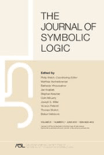
JOURNAL OF SYMBOLIC LOGIC
Scope & Guideline
Challenging Conventional Thought Through Rigorous Research
Introduction
Aims and Scopes
- Model Theory:
The journal emphasizes research in model theory, exploring structures, definability, stability, and categoricity within various logical frameworks. - Set Theory:
Papers often delve into set-theoretic concepts, including large cardinals, forcing, and the foundations of set theory, providing insights into the axiomatic and philosophical aspects of mathematics. - Computability and Descriptive Set Theory:
The journal publishes works on computability theory, including degrees of unsolvability and the intricacies of definability in descriptive set theory. - Algebraic Logic:
Research on algebraic logic, including the study of algebraic structures in relation to logical systems, is a core aspect of the journal's scope. - Proof Theory and Formal Systems:
Contributions discussing proof-theoretic aspects, including completeness, consistency, and the interaction between different axiomatic systems, are frequently featured. - Applications of Logic in Other Disciplines:
The journal showcases applications of symbolic logic in fields such as computer science, philosophy, and mathematics, bridging theoretical research with practical implications.
Trending and Emerging
- Higher-Order Logic and Non-Classical Logics:
There is a growing interest in higher-order logics and non-classical logics, with papers exploring their applications and theoretical implications, reflecting a trend towards expanding the boundaries of traditional logic. - Forcing and Large Cardinals:
Research on forcing techniques and large cardinals has surged, indicating an increasing focus on set-theoretic methods and their implications for both logic and mathematics. - Connections to Computer Science:
The intersection of logic with computer science is becoming more prominent, with studies on algorithmic aspects of logic, computability, and their applications in programming and formal verification. - Categorical Logic:
Emerging trends in categorical logic are evident, showcasing the application of category theory to logical frameworks, which is gaining traction in the community. - Dynamic Logic and Temporal Logic:
The exploration of dynamic and temporal logic is on the rise, as researchers investigate how these logics can model and reason about change over time, reflecting a shift towards more applied logic.
Declining or Waning
- Classical Logic:
Research focused on classical logic, particularly basic propositional and predicate logic, has seen a notable decrease, possibly due to the rise of more complex and nuanced logical systems. - Elementary Set Theory:
Papers addressing elementary aspects of set theory have become less common, as the journal shifts towards more advanced and specialized topics within set theory and logic. - Traditional Proof Systems:
The exploration of traditional proof systems has waned, with an increasing emphasis on alternative approaches and modern developments in proof theory. - Foundational Issues in Mathematics:
While foundational questions remain important, fewer articles are dedicated to classical foundational issues, reflecting a shift towards more applied and advanced theoretical explorations.
Similar Journals

JOURNAL OF AUTOMATED REASONING
Catalyzing Breakthroughs in Software and ReasoningJOURNAL OF AUTOMATED REASONING is a premier academic journal published by SPRINGER, focusing on the dynamic and evolving fields of Artificial Intelligence, Computational Theory and Mathematics, and Software. With an ISSN of 0168-7433 and E-ISSN 1573-0670, this journal ranks impressively in the second quartile (Q2) across multiple categories, reflecting its significant contribution to the advancement of knowledge in automated reasoning methodologies. Since its inception in 1985, it has served as a vital platform for researchers and professionals to share groundbreaking findings and innovative techniques, facilitating the exploration of algorithms, logical frameworks, and reasoning processes that underpin artificial intelligence systems. Although it does not currently offer Open Access options, it remains a highly regarded resource, cited widely in academia, with its impactful publications reflecting deep insights and rigorous scholarly standards. The journal’s esteemed status and its ongoing commitment to fostering a greater understanding of automated reasoning make it an invaluable asset for those dedicated to pushing the boundaries of these interdisciplinary fields.
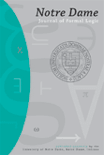
Notre Dame Journal of Formal Logic
Bridging Disciplines Through Rigorous Logic ResearchNotre Dame Journal of Formal Logic is a premier academic publication dedicated to the advancement of research in the field of logical studies. Published by DUKE UNIVERSITY PRESS, this journal has been a significant contributor to the discipline since its inception in 1960, with an impressive convergence of scholarly articles expected to continue through 2024. With its focus on rigorous formal logic, the journal plays a crucial role in fostering discussions that bridge mathematics and philosophical inquiry, holding a notable Q2 ranking in the 2023 Logic category. Despite its non-open-access status, the journal reaches a wide audience of researchers, professionals, and students committed to exploring the foundational aspects of logics. Located in Durham, NC, it provides a platform for innovative thought and critical engagement within the logic community. With its impactful contributions, the Notre Dame Journal of Formal Logic stands as a vital resource for those seeking to deepen their understanding of both classic and contemporary logical theories.

FUNDAMENTA MATHEMATICAE
Enriching the academic landscape with high-impact findings.FUNDAMENTA MATHEMATICAE is a distinguished journal in the realm of mathematics, focusing on algebra and number theory, published by the Polish Academy of Sciences, Institute of Mathematics - IMPAN. With a rich publication history dating back to the late 20th century, it serves as a vital platform for innovative research, fostering intellectual discourse among mathematicians globally. As a Q3 journal in the 2023 category for Algebra and Number Theory, it holds an essential place within the academic community, particularly noted for its contribution to advancing theoretical knowledge and practical applications in mathematics. Although it does not currently offer an open access model, the journal's commitment to quality and rigor ensures that the research disseminated is of high impact and relevance. It actively supports the scholarly pursuits of researchers, professionals, and students alike, making it an invaluable resource for those dedicated to the mathematical sciences.
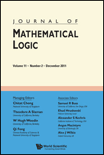
Journal of Mathematical Logic
Unraveling the Mysteries of Logic and ReasoningJournal of Mathematical Logic, published by World Scientific Publishing Co Pte Ltd, stands as a premier platform for the dissemination of cutting-edge research in the field of logic, with a notable Q1 ranking in the category of Logic for 2023. Catering to an international audience of researchers, professionals, and students, this journal serves as a vital resource for the latest advancements and theoretical developments in mathematical logic. Spanning from 2007 to 2024, the journal emphasizes contributions that explore both foundational and applied aspects of logic, thereby appealing to a diverse readership. Although currently subscribed access only, the journal’s rigorous peer-review process ensures high-quality publications that enrich the academic discourse within the mathematical community. With its strategic location in Singapore, the Journal of Mathematical Logic not only contributes to the global conversation in mathematics but also fosters collaboration among scholars from various backgrounds.

Computability-The Journal of the Association CiE
Fostering Academic Exchange in Computational TechnologiesComputability - The Journal of the Association CiE, published by IOS PRESS, is a premier academic journal dedicated to advancing the field of computational theory and its applications. Established in 2012, this journal serves a diverse audience, including researchers, professionals, and students involved in the realms of Artificial Intelligence, Computational Theory and Mathematics, and Theoretical Computer Science. With robust categorization in Q2 and Q3 quartiles for various related fields, it provides a vital platform for innovative research and discussions that shape the landscape of computational technologies. Although it operates under a subscription model, the quality of published content ensures significant academic contributions and offers valuable insights relevant to contemporary scientific challenges. Researchers interested in the intersection of computation and its practical implications will find Computability an essential resource for exploring cutting-edge developments and fostering scholarly exchange.
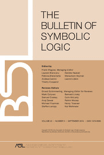
BULLETIN OF SYMBOLIC LOGIC
Illuminating the Pathways of Logical InquiryBULLETIN OF SYMBOLIC LOGIC, published by Cambridge University Press, is a distinguished academic journal that serves as an essential platform for the dissemination of research in the realms of logic and philosophy. Since its inception in 1995, this journal has progressed through its convergence years and remains committed to fostering intellectual discourse among scholars. With a 2023 ranking in the Q1 category of Philosophy and a Q3 classification in Logic, it continues to uphold its reputation as a significant contributor to the field. While operating under a traditional subscription model, the journal dedicates itself to publishing high-quality articles that explore foundational issues, advanced theories, and innovative insights in symbolic logic. Researchers, professionals, and students will find invaluable resources within its pages, particularly as it ranks favorably among peers, with noteworthy standings in Scopus rankings. For those seeking to deepen their understanding of logical frameworks and their philosophical implications, BULLETIN OF SYMBOLIC LOGIC is an indispensable resource.

Reports on Mathematical Logic
Innovating Ideas at the Intersection of Logic and PhilosophyReports on Mathematical Logic is an esteemed academic journal published by Jagiellonian University’s Theoretical Computer Science Department in Poland. Focusing on the interdisciplinary realms of logic and philosophy, this journal publishes rigorous research articles that explore the foundational aspects and implications of mathematical logic in various contexts. Although it currently maintains an open access model, the journal's impact can be seen through its categorized rankings, with a Q4 in Logic and a commendable Q2 in Philosophy as of 2023. This positions it as a valuable resource for academics seeking to engage with innovative ideas and methodologies in the field. Additionally, the journal has a historical academic presence, having converged in its publication years from 2011 to 2014 and again from 2016 to 2023, underscoring its ongoing commitment to advancing knowledge in logic. With a focus on contemporary research, Reports on Mathematical Logic is essential for researchers, professionals, and students aiming to stay at the forefront of logic studies.

Journal of Logic Language and Information
Bridging Disciplines: Where Logic Meets LanguageThe Journal of Logic Language and Information, published by SPRINGER, stands as a leading interdisciplinary platform dedicated to the exploration of the interconnections between logic, language, and information theory. With a history spanning from 1992 to 2024, this esteemed journal provides a vital forum for researchers, professionals, and students in fields such as Computer Science, Linguistics, and Philosophy. Notably recognized in the 2023 rankings, it holds a Q2 quartile in Computer Science (miscellaneous) and Q1 quartiles in both Linguistics and Language, and Philosophy, reflecting its high academic quality and relevance. Despite its nuanced focus, the journal's diverse scope attracts a global readership, encouraging innovative research and critical discourse. Although it is not an Open Access publication, the Journal's valuable contributions can be accessed through various institutional subscriptions, ensuring that its scholarly output remains influential within the academic community.
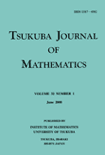
Tsukuba Journal of Mathematics
Cultivating a Community of Mathematical ExcellenceTsukuba Journal of Mathematics is a distinguished publication dedicated to advancing the field of mathematics through the dissemination of innovative research and comprehensive studies. Published by the University of Tsukuba, Department of Mathematics, this journal serves as a vital platform for mathematicians, researchers, and students to engage with cutting-edge mathematical theories and methodologies. Although currently not available as an open-access journal, it maintains a strong academic presence, contributing significantly to the global mathematical landscape. The journal invites submissions across various branches of mathematics, aiming to foster scholarly communication and collaboration. The ISSN 0387-4982 and the E-ISSN 2423-821X further establish its credibility and accessibility among the academic community, supporting its critical objective of facilitating high-quality research output. Situated in Tsukuba, Japan, a hub for scientific research and development, the Tsukuba Journal of Mathematics is committed to bridging gaps in mathematical knowledge and encouraging exploration of novel ideas.

Pure and Applied Mathematics Quarterly
Pioneering Insights in Pure and Applied MathematicsPure and Applied Mathematics Quarterly is a prestigious journal published by INT PRESS BOSTON, INC, focusing on the diverse and evolving field of mathematics. Since its inception in 2007, this journal has grown significantly, currently holding a Q1 ranking in the Mathematics (Miscellaneous) category for 2023, positioning it among the leading publications in the discipline. With a commitment to publishing high-quality research, Pure and Applied Mathematics Quarterly fosters innovation and dialogue within the mathematical community by providing a platform for theoretical advancements and practical applications. The journal remains accessible to researchers and professionals through its ISSN 1558-8599 and E-ISSN 1558-8602, although it does not currently offer open access. As a vital resource for mathematicians, educators, and students, this journal endeavors to expand the frontiers of mathematical knowledge and contribute to the academic dialogue surrounding this fundamental science.